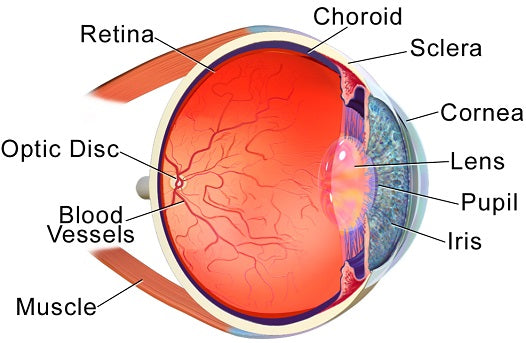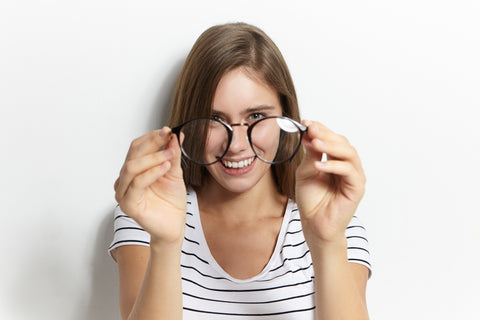The following are the most common eye conditions:
- Dry eyes. This problem occurs when eyes are unable to produce enough tears (complex mixture of water, mucus, and fatty oils). Possible causes may include dehydration, central heating, caffeine, excessive sugar in the blood, hormonal imbalance during menopause, some medications, and especially deficiency of omega 3, omega 7, vitamin D and A.
- Glaucoma - damaged eye’s optic nerve leading to a vision loss and blindness. It is believed that most cases of glaucoma are caused by anincreased pressure in the eye which gradually damages the nerve fibres that are essential to vision. However, in about 25% cases glaucoma develops when eye pressure is normal. There is evidence that this non-pressure related damage to the optic nerve is actually a form of an autoimmune neuropathy > (own immune system attacks and damages the optic nerve).
- Cataract - clouding of the lens that often blurs vision. It is the most common age-related eye problem. It is usually treated with a surgery.
- Macular degeneration – another age-related eye condition that affects macula, part of the eye that allows human eye to see fine detail. It is the leading cause of vision loss in people over 50.
- Diabetic retinopathy - caused by chronic high blood sugar levels which damage retinal capillaries (smallest blood vessels found in the eye). If left untreated it will gradually lead to a permanent vision loss.
- Keratoconus - thinning of the cornea (most prevalent among younger people) which leads to various vision problems including near-sightedness, blurred or double vision, astigmatism, and increased sensitivity to light.
- Refractive errors (mostly caused by changed shape of the eye):
- Near-sightedness (myopia) - faraway objects look blurry;
- Far-sightedness (hyperopia) - near objects are not clear;
- Astigmatism – images are stretched out and blurry;
- Presbyopia – an age-related hardening of lens and loss of elasticity leading to long-sightedness (difficulty to clearly see close objects).

Key Factors That Can Contribute To Poor Eye Health
The following nutritional and lifestyle factors are known to increase the risk of developing eye problems:
- Low consumption of dark green leafy vegetables, raw vegetable salads, and fresh fruits containing eye-protective antioxidants such as lutein,zeaxanthin, and beta-carotene.
- Deficiency vitamins and minerals especially vitamin D, E & A, magnesium, zinc, and selenium caused by regular consumption of refined low in nutrients foods, avoiding good quality nutritional supplements, use of stimulants, and chronic stress.
- t is believed that chronic exposure to unopposed digital blue light from LED and fluorescents will significantly contribute to an epidemic of blindness in the next decades. LEDs and fluorescents, although energy efficient, are digital lights and not analogue thermal light sources. They have unbalanced wavelengths that are very different from the natural blue and other waves emitted by the sun. They have a predominance of digital blue frequencies that increase production of damaging free radicals, and they also lack the red, infrared and near infrared healing frequencies that stimulate regeneration and repair that are found in thermal light sources like the incandescent bulbs.
- Other factors that are known to increase the risk of eye problems include sluggish blood circulation in the eye (caused by sedentary lifestyle, high blood cholesterol and dehydration), lack of sleep and rest, smoking, ageing, alcohol, caffeine, stress, toxins such as heavy metals, high blood sugar levels and diabetes, harmful radiation (such as X-rays, overexposure to UV-rays, etc.), chronic constipation, poor liver and kidney function,drinking insufficient amount of water, regular use of medication such as antibiotics and antihistamines.
Are Aged People Sentenced To Poor Eye Health
Many of us think that as we grow older our eyesight is destined to deteriorate. The truth is, however, that if we are on a healthy, high in fibre, vitamins, minerals and antioxidants diet, exercise on a regular basis improving blood circulation in our eyes, if we are able to control stress, drink plenty of clean water, avoid harmful radiation, and include the most eye-protective nutritional supplements and natural detoxifying agents then there is no reason for our vision to worsen with time.

Key Principles To Prevent And Treat Eye Problems
- If possible often consume spinach, kale and other leafy greens, black currants, bilberries, blueberries, carrots. Vitamin A and carotenoids found in vegetables and fruits can prevent cataract but it was discovered that not carrots but spinach is much more effective in producing this effect. Scientists believe that it is so because apart from beta-carotene spinach is high in other powerful carotenoids that are not found in carrots. Try eating your spinach raw or steamed but not cooked.
- Drink about 2 litres of water a day.
- Every day before breakfast take 1 or 2 full tablespoons of the mixture of high in chlorophyll super greens including barley grass, wheat grass, moringa, alfalfa, spirulina and especially chlorella as they are powerful detoxifiers and energy boosters.
- Quit smoking and stay away from alcohol, sugar, salt, caffeine, black tea, and caffeinated products. In this way you will improve kidney and liver function, promote detoxification of the body and eyes, and reduce dry eye symptoms, as stimulants (especially caffeine) are known to cause dehydration.
- Avoid (reduce) butter and replace refined salt with Celtic salt or pink salt. One study found that people who eat the highest amounts of butter and refined salt have double the cataract risk compared to those who eat the lowest amounts of these foods.
- Position your computer screen below eye level and take frequent brakes.
- Avoid Artificial Blue Light because it is believed that chronic exposure to unopposed digital blue light from LED and fluorescents will significantly contribute to an epidemic of blindness in the next decades. LEDs and fluorescents, although energy efficient, are digital lights and not analogue thermal light sources. They have unbalanced wavelengths that are very different from the natural blue and other waves emitted by the sun. They have a predominance of digital blue frequencies that increase production of damaging free radicals, and they also lack the red, infrared and near infrared healing frequencies that stimulate regeneration and repair that are found in thermal light sources like the incandescent bulbs. Clear incandescent bulb, although not energy-efficient, seem to be the best light to use at night. If you use LED and fluorescent lights, protect your eyes, after sunset by wearing good blue-blocking glasses to prevent exposing retina to unopposed blue light, especially in the absence of balancing sunlight.
Main Dietary Nutrients To Promote Eye Health
- n 1992, a study at Harvard Medical School in Boston surveyed almost 60,000 nurses and discovered that those who ate spinach five or more times per week, as well as those who took vitamin C supplements for 10 years or more, reduced their risk of cataract surgery by almost 50 %. Although other carotenoids in spinach could have been responsible for that effect, this study suggests the benefits of dietary lutein and zeaxanthin. Lutein and zeaxanthin are primarily found in green leafy vegetables, with kale and spinach. Lower concentrations of both nutrients are also found in orange- and yellow-coloured fruits and vegetables. According to one study, orange pepper had the highest amount of zeaxanthin. Research also suggests that most of the dark green leafy vegetables may have 15 to 50 % of lutein, but they are too low in zeaxanthin (only 0 to 3 percent).
- Dark blue and almost black-coloured berries like black currants and bilberries contain high amounts of the antioxidant anthocyanins which are known to help improve blood circulation in the eye by strengthening capillaries that carry nutrients to the eyes and protect them from eye-strain and fatigue. A 2005 study showed that rats with senile cataract and macular degeneration who received 20 mg of bilberry extract per kilo of body weight had no impairment of the lens and retina anymore.
- Beta-carotene (pro-vitamin A) found in greens, carrots and other plant foods help protect the eyes from infections and prevent dry eyes and night blindness.
Most Important Nutritional Supplements For Eye Health
- Supplements containing antioxidants lutein and zeaxanthin have been found to protect against glaucoma, macular degeneration, and cataracts. Apart from preventing damaging effect of free radicals generated by junk foods and stress, lutein and zeaxanthin help block harmful radiation from reaching the underlying structures in the retina, thereby reducing the risk of light-induced oxidative damage. It is important to be aware of the fact that studies have found health benefits for lutein at a dose of 10 mg per day, while for zeaxanthin at 2 mg per day. Unfortunately on an average adults get only up to 20% of that amount from their diet each day. For this reason a proper supplementation seems to be a very reasonable idea.
- Astaxanthin is produced by the microalgae Haematococcus pluvialis when its water supply dries up, forcing it to protect itself from UV radiation. Astaxanthin is far more powerful an antioxidant than both lutein and zeaxanthin. Many researchers believe it to be the most powerful antioxidant for eye health. Apart from preventing and helping reverse eye damage Astaxanthin also helps maintain normal eye pressure levels, and supports your eyes' energy levels and clear vision. Looking for Astaxanthin supplements use only vegan sources (micro algae) and not those that are derived from crustaceans like krill or shrimp as they are created to be natural water filters and are contaminated with heavy metals and toxins.
- Vitamin D, which deficiency is rampant today, has a protective role in the development of dry eyes and its deficiency appears to be linked with higher risk of blindness and age-related eye degeneration as well as with autoimmune conditions that affect eyes. It was shown that lack of this vitamin alsocontributes to glaucoma Remember to take vitamin D3 with good magnesium (such as citrate) because in people who are deficient in this mineral vitamin D proved to be useless as it requires magnesium for its conversion in kidneys. Besides, eyes affected by glaucoma often contain lower levels of magnesium than eyes without glaucoma.
- Vitamin E is a powerful antioxidant that contributes to the protection of the eye cells from oxidative damage caused by free radicals. It was shown that in some cases of cataract vitamin E was able to halt the progress or even reverse damage. About 200-400 IU of vitamin E per day is recommended.
- Ginkgo biloba appears to improve preexisting visual field damage in some patients with normal tension glaucoma (NTG). According to another study, Ginkgo biloba improves ocular blood flow, indicating its potential therapeutic benefits in the treatment of glaucoma.
- Vitamin A and beta-carotene help protect the eyes from infections and prevent dry eyes and night blindness.
- Zinc contributes to the normal immune system function and absorption of vitamin A. It also assists various antioxidants in reducing oxidative damage in the eyes.
- Omega-3 fatty acids (DHA & EPA) have shown to be beneficial for individuals with dry eye syndrome and macular degeneration. It may also help proper drainage of intraocular fluid from the eye, decreasing the risk of increased eye pressure.
- Grape Seed is a source of two powerful antioxidants proanthocyanidins and oligomeric proanthocyanidins that are known to reduce the risk of various degenerative eye problems.
- Bioflavonoids protect blood vessels, including delicate capillaries in the retina and help improve blood circulation in the eye.
- Alpha lipoic acid has proven its ability to prevent oxidative stress caused by radicals and other factors in nerve tissue. It helps to maintain high glutathione levels which are found to be depleted in individuals diagnosed with cataract and other eye problems. Current research also reveals protective effects of alpha lipoic acid in neuropathy, excitotoxic amino acid brain injury, mitochondrial dysfunction, and other causes of damage to neural or brain tissue.
- Many people with eye problems such as glaucoma have low levels of vitamin B12. Since deficiency of this important neuro-protective vitamin is regarded as rampant today, it is recommended to take 1,000-2,000 mcg of sublingual methylcobalamin (most absorbable form of B12) under the tongue after breakfast.
- Take good quality probiotic formulas.
Characteristic Of A Good Eye Supplement
When looking for a good and effective eye supplement it is important to find one with as many of the most important listed above antioxidants, vitamins and minerals as possible. Ideally, this supplement should include 10mg of Lutein, 2mg of zeaxanthin, Bilberry, Vitamin E, Zinc, Vitamin A (or Beta-carotene), Vitamin C. Supplementation of Vitamin D3 (at least 5,000 IU per day) and Magnesium is required separately because even if they are included in eye formulas the concentration of these two nutrients in eye supplements is always way too low due to multiple ingredients. Also mentioned above mixture of super greens is a great choice to boost the benefits.
References
- Jiucheng He, Haydee E P Bazan (2010). Omega-3 fatty acids in dry eye and corneal nerve regeneration after refractive surgery. Prostaglandins Leukot Essent Fatty Acids. 2010 Apr-Jun;82(4-6):319-25. Epub 2010 Mar 3. PMID: 20202804
- Seok Hyun Bae, Young Joo Shin, Ha Kyoung Kim, et al (2016). Vitamin D Supplementation for Patients with Dry Eye Syndrome Refractory to Conventional Treatment. Sci Rep. 2016 Oct 4 ;6:33083. Epub 2016 Aug 4. PMID: 27698364
- Pelin Yildirim, Yeşim Garip, Ayse Aslihan Karci, Tuba Guler (2015). Dry eye in vitamin D deficiency: more than an incidental association. Int J Rheum Dis. 2015 Aug 13. Epub 2015 Aug 13. PMID: 26269110
- K J Blades, S Patel, K E Aidoo (2001). Oral antioxidant therapy for marginal dry eye. Eur J Clin Nutr. 2001 Jul;55(7):589-97. PMID: 11464232
- Jessica Kvansakul, Marisa Rodriguez-Carmona, David F Edgar, et al (2006). Supplementation with the carotenoids lutein or zeaxanthin improves human visual performance. Ophthalmic Physiol Opt. 2006 Jul; 26(4):362-71. PMID: 16792735
- A randomized, placebo-controlled, clinical trial of high-dose supplementation with vitamins C and E, beta carotene, and zinc for age-related macular degeneration and vision loss: AREDS report no. 8. Arch Ophthalmol. 2001 Oct;119(10):1417-36. PMID: 11594942
- Shaheen Patel, Joyce J Mathan, Ehsan Vaghefi, Andrea J Braakhuis (2015) The effect of flavonoids on visual function in patients with glaucoma or ocular hypertension: a systematic review and meta-analysis. Graefes Arch Clin Exp Ophthalmol. 2015 Sep 4. Epub 2015 Sep 4. PMID: 26340868
- David A Newsome (2008) A randomized, prospective, placebo-controlled clinical trial of a novel zinc-monocysteine compound in age-related macular degeneration. Curr Eye Res. 2008 Jul;33(7):591-8. PMID: 18600492
- A Zh Fursova, O G Gesarevich, A M Gonchar, N A Trofimova, N G Kolosova (2005) Dietary supplementation with bilberry extract prevents macular degeneration and cataracts in senesce-accelerated OXYS rats. Adv Gerontol. 2005;16:76-9. PMID: 16075680
- Ali H Durukan, Cem Evereklioglu, Volkan Hurmeric (2006) Ingestion of grape seed proanthocyanidin extract to prevent selenite-induced oxidative stress in experimental cataract. J Cataract Refract Surg. 2006 Jun;32(6):1041-5. PMID: 16814068
- Siobhan E Moriarty-Craige, Khoi-Nguyen Ha, Paul Sternberg (2007) Effects of long-term zinc supplementation on plasma thiol metabolites and redox status in patients with age-related macular degeneration. Am J Ophthalmol. 2007 Feb;143(2):206-211. Epub 2006 Nov 9. PMID: 17157802
Images: Happy model photo created by karlyukav - www.freepik.com
Any information or product suggested on this website is not intended to diagnose, treat, cure or prevent any medical condition. Never disregard medical advice or delay in seeking it because of something you have read on this website. Consult your primary healthcare physician before using any supplements or making any changes to your regime.




